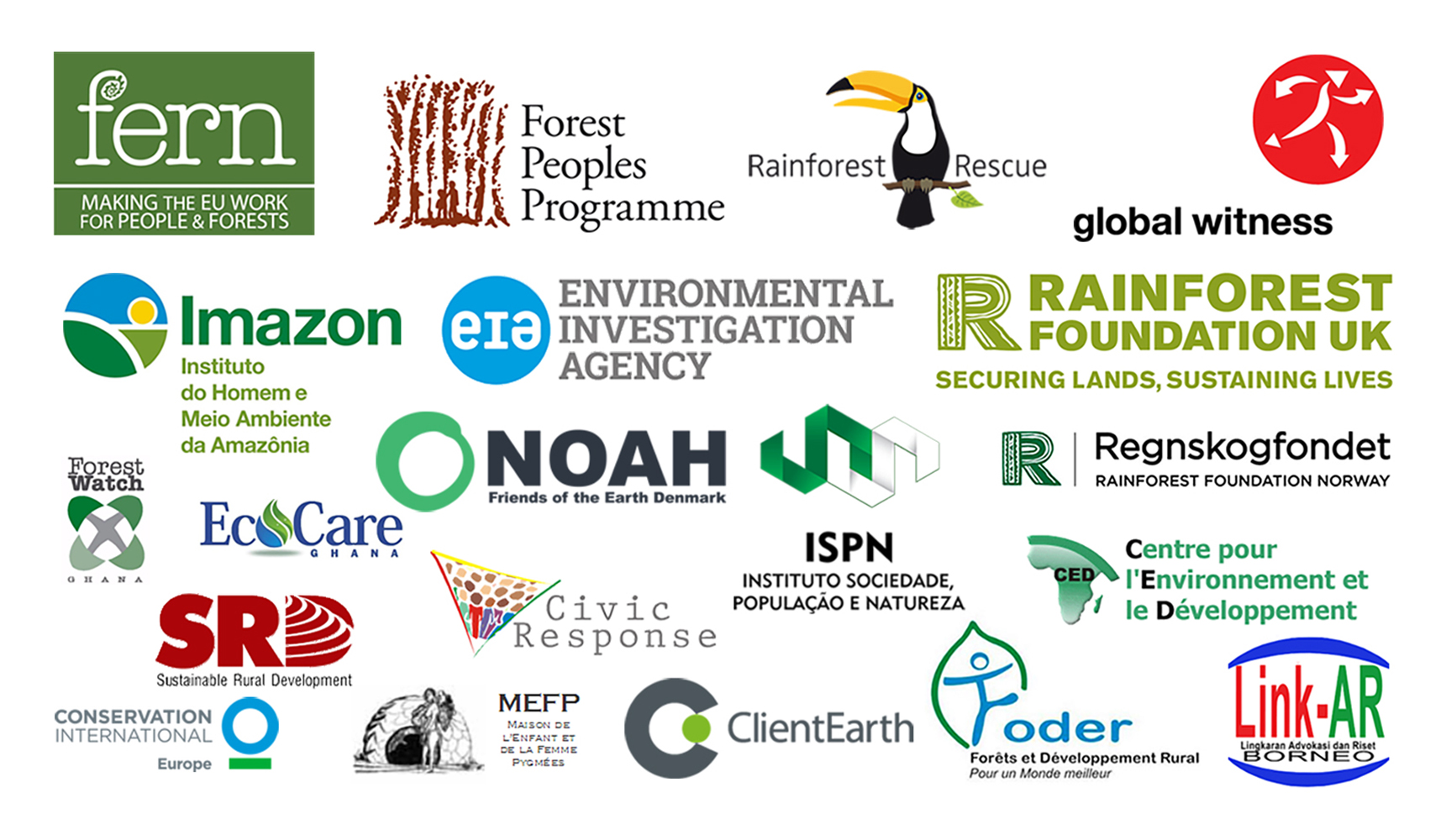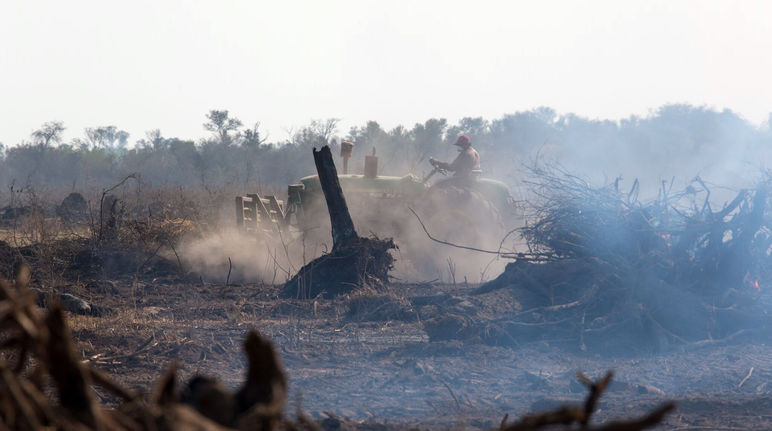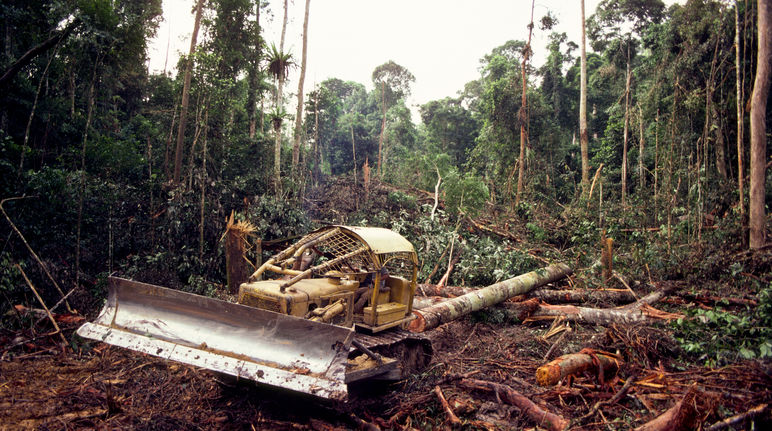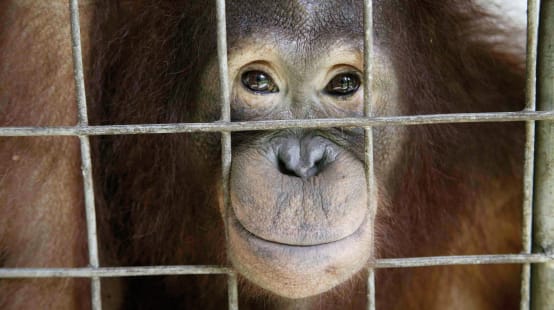Time’s almost up. Tell the EU to act on deforestation now!
Did you know that our consumption habits fuel deforestation worldwide? The production of agricultural commodities such as beef, soy, palm oil and cocoa is responsible for 70% of all deforestation! The EU, which imports huge amounts of these products, has committed to stop deforestation by 2020. With only 20 months left, it must act now!
Call to actionTo: the European Commission
“Time is almost up for the EU to achieve its deforestation commitments, we urgently need an EU Action Plan to protect forests and respect people’s rights.”
Beef, soy, palm oil, cocoa: these products are key ingredients of products consumed every day in rich countries: cocoa is turned into chocolate, palm oil is used to make snacks, cosmetics or petrol, and over 70% of world soy production feeds animals so that we can drink their milk and eat their meat.
Production of these ingredients drives massive deforestation worldwide, destroying forests in Indonesia, Cote d’Ivoire, Argentina, Brazil and many other forested countries. The expansion of plantations and farms has also led to evictions, violence, intimidation, slave labour and murder of local communities and activists.
The EU is the second biggest importer of agricultural products resulting from deforestation. An area of forest the size of Portugal was lost globally between 1990 and 2005 because of EU consumption of commodities grown on deforested land - much of it illegal.
Although the EU has committed to halt and reverse deforestation and forest degradation by 2020, it has never taken any steps to stop the terrible impacts that result from its consumption of these goods.
With only 20 months until 2020, we must act now!
Sign this petition to ask the European Commission to ensure the EU lives up to its commitments to halt deforestation by proposing an EU Action Plan, including legislation to protect forests and forest peoples’ rights. This is the best way to guarantee that no products or financial transactions linked to the EU cause deforestation, forest degradation or human rights abuses.
Background
Organisations endorsing the petition
The terrible impacts of industrial agricultural commodities on forests and human rights
The production of agricultural commodities violates the human rights of local communities.
Testimony: Jamaludin, from the Semunying community, Kalimantan, Indonesia: “We are criminalized by the state, we asked why? Is it wrong that we fight for our rights? The police treatment of us in the prison was inhumane. We were threatened by the authorities.”
The farming and harvesting of beef, soy, cocoa and palm oil can be deadly. The expansion of plantations and farms has led to evictions, violence, intimidation, slave labour and murder of local communities and activists.
Activists are being criminalised and murdered: in mid-April this year, palm oil activist Nazildo dos Santos Brito was murdered in Brazil for defending land rights. According to Global Witness, 2016 saw a record 200 killings of people defending their land, forests and rivers against destructive industries. Brazil is one of the most dangerous countries for activists: according to the Brazilian Pastoral Land Commission (CPT), 3,964 people were arrested between 1995 and 2014, in the context of rural struggles organised by workers, union and social movement leaders, and human right defenders.
NGO and media investigations have also documented innumerable cases of communities being displaced or denied access to livelihoods as a result of palm oil encroachment worldwide. In Indonesia alone, there were some 4,000 land disputes between communities and palm oil growers across the country.
The rights of the people who work in the plantations are violated. Cocoa farmers’ poverty has been at the root of child labour in West Africa. More than two million children worked under hazardous conditions growing cocoa in Côte d’Ivoire and Ghana in 2013/14. In palm oil plantations, reported problems include very low pay for plantation workers, inattention to health and safety, trafficking of workers and debt bondage.
The production of agricultural commodities has terrible impacts on health: Industrial agrobusiness production relies on the use of glyphosate and Genetically Modified Organisms for cropping soya, which poisons the water and causes diseases for humans and animals.
Testimony: Catalina Cendra, farmer from the Chaco, Argentina: “They came to make us sick with soy here, in the Chaco. And I believe all over Argentina too. ... They come, sow, poison, harvest and go away. ...
The planes [spraying herbicides] passed at 6:00 a.m. They poisoned the water, the tank, the well and we drank it and the animals drank it. We ended up sick, my animals and I. They made us sick.”
The production of industrial agricultural commodities destroys nature and wildlife:
Testimony: Margareta, from the Semunying community, Kalimantan, Indonesia: “We have no forests left – it makes me very sad. Since the oil palm plantations started operations here, the family has become divided, there is conflict. Our forests have been destroyed, I don’t know how it will recover. Without it, life has no meaning.”
There are various problems: with cattle for example, forests are initially torn down to make way for pasture. The ground is later converted to growing soy, which is more profitable. This leaves less room for cattle, pushing cattle into forests elsewhere. This routinely happens in Brazil.
Oil palm is only grown in equatorial regions, such as in Indonesia and Malaysia, so the expansion has had a particularly bad impact on tropical forests, often high conservation value forests, rich in biodiversity and wildlife.
Cocoa has caused massive deforestation in West Africa. For example, Côte d’Ivoire, the world’s largest producer, has lost nearly 80% of its forest cover since 1960
Testimony: Henri, a traditional leader from near the town of Diafla, Côte d’Ivoire: “This all used to be trees, but farmers burned them to plant cocoa.”
Going beyond company voluntary commitments
The numbers of corporate voluntary commitments to stop deforestation for agriculture have rapidly increased. Meanwhile, deforestation rages on.
This paradox can be explained by the fact that very few companies can actually trace the products they are using back to from the farm or forests they come from. The numbers will make you dizzy: only 2% of palm oil companies can fully trace their supply back to the forest. In the soy sector, it’s only 14% that can trace back to the farm.
In the beef sector, only 17% of cattle companies assessed in 2017 had forest protection policies.
This is why public policy is needed. The EU has a key role to play!
The EU, a top importer with a high responsibility
Testimony: Several Members of the European Parliament have repeatedly called on the European commission to regulate so that the food we consume and import does not have negative social and environmental impacts: the EU has the duty to act
The European Union is the second biggest importer of agricultural products resulting from deforestation. An area of forest the size of Portugal was lost globally between 1990 and 2005 because of EU consumption of commodities grown on deforested land, much of it illegal.
The EU is the world’s largest importer of raw cocoa, responsible for over 60% of global imports. It is the second most important importer of soy and of palm oil. It is also one of the major importers of beef from the Mercosur region, which includes Argentina, Brazil, Paraguay and Uruguay
The EU therefore has the duty to act and the power to stop deforestation stemming from agricultural production.
The EU must live up to its international commitment to halt deforestation
The European Union has committed to stop deforestation by 2020.
It has already shown it can ensure that the fish we eat and the timber we buy is legal. Yet, it has never taken any measure to tackle the negative impacts from agricultural products.
With only 20 months until 2020, it must act now!
And the call for action is growing… in March, the European Commission published options to tackle deforestation. Germany, France, the United Kingdom, the Netherlands, Denmark,Members of the European Parliament, progressive companies and NGOs worldwide have called on the European Commission to act.
But so far, the Commission is not listening.
You can make a difference: Sign this petition to ask the European Commission to live up to its commitments to halt deforestation and propose an EU Action Plan, with legislation to protect forests and forest peoples’ rights. Such action would guarantee that no products or financial transactions linked to the EU cause deforestation, forest degradation or human rights abuses.
To: the European Commission
Ladies and Gentlemen,
Forests are essential for life. They provide a livelihood to one in six people, a home for 80 per cent of the world’s terrestrial biodiversity and they are crucial for our climate.
As you know, tropical dry forests and rainforests, forest peoples as well as wildlife are in danger because of the production, consumption and trade of everyday ingredients such as soya, beef, palm oil and cocoa, which trigger large scale deforestation, pollution, land grabs and human rights abuses.
As the biggest importer of cocoa, and the second biggest importer of soya and palm oil, the European Union has the duty to act and the power to stop this.
Although the EU has committed to halt and reverse deforestation and forest degradation by 2020, it has never taken any steps to stop the terrible impacts that result from its consumption of these goods.
A study published in March 2018 by the Commission proposed options to tackle deforestation. But so far, the Commission has not committed to an action plan, despite the fact that EU Member States including Germany, France, the United Kingdom, the Netherlands, and Denmark, Members of the European Parliament, progressive companies and NGOs have all called on the Commission to act.
There are only 20 months left for the EU to uphold its international commitment on deforestation. The European Commission must therefore urgently propose binding legislation so that their full effect will be felt by 2020.
We, the undersigned international citizens, urge you to live up to the EU’s commitments. We demand that you urgently propose an EU Action Plan, with legislation to protect forests and forest peoples’ rights, which will guarantee that no products or financial transactions linked to the EU result in deforestation, forest degradation or human rights abuses.
Yours sincerely,















 Recent successes
Recent successes